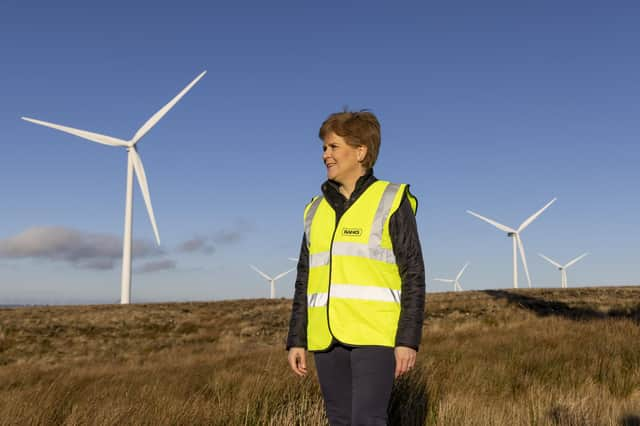SNP needs to realise Scotland's future as 'renewable powerhouse' depends on size of UK market – Brian Wilson


Last year, the cost was £227 million which was up from £143 million the year before. The vast majority came to Scotland including £100 million to two offshore windfarms, Beatrice and Moray East. The £227 million was borne by the broad shoulders of British consumers, so nobody really notices amidst everything else. For Scotland alone, it would be 11 times more significant.
I am reminded of Catch-22 and Major Major’s father: “The more alfalfa he did not grow, the more money the government gave him, and he spent every penny he didn't earn to increase the amount of alfalfa he did not produce.”
Advertisement
Hide AdAdvertisement
Hide AdIf wind is not to become the new alfalfa, a hard truth needs recognition. There is no prospect of generating vast quantities of renewable energy unless there is somewhere to send it. And that somewhere is the rest of Britain.
The Scottish Government assures us that by 2030 “Scotland will be a renewable powerhouse”. Well, we hope so. A lot hangs on the opportunity not being blown this time. But it will not happen without maximum co-operation with the rest of our sceptred isle – ie, the market.
For 20 years, consumers throughout Britain have supported the growth of Scottish renewables through subsidy, transmission investment and now constraint payments. This has proved a sound investment which brought down the cost of wind generation. It should not be too difficult to acknowledge that only the scale of a British market has made (or will make) it possible.
Reading the Scottish Government’s paper, I was struck by how little recognition was given to the dependence of their entire strategy on the market we supply. In contrast, it contains a list of demands about “actions the UK Government must take”. This chippy attitude will get us nowhere and indeed jeopardises the massive potential that exists.
I attended an event this week held by the Celtic Sea alliance on offshore wind and was struck by the difference in tone. In the south-west of England, Wales and the Republic of Ireland, it seems making common cause across borders and party lines is not a problem. There was a real sense of vision and shared purpose to create a new industry with massive potential for industry, jobs and the environment.
We need the same approach in Scotland, rather than the pretence we are being held back by some recalcitrant neighbour. It simply isn’t true. If all this is going to happen, we need to work together with as little politics involved as possible.
The designation of two freeport regions is a step in the right direction but it has been achieved in the teeth of negativity from the Scottish Government and we are already a couple of years behind parts of England which will be competing in the same market for investment.
The other main feature of the energy strategy was to intimate a “presumption against” new oil and gas developments in the North Sea. Fortunately for the 200,000 people employed in the industry, they can presume as much as they like but do not have the power to decide.
Advertisement
Hide AdAdvertisement
Hide AdThe transition from fossil fuels to clean energy can be a massive success story for Scotland and the UK as a whole and it is a process which will stretch over decades. So why throw out the baby before the bath is even filled?
At other times, Norway is held before our eyes as a sainted example. Its oil output is expected to rise by seven per cent this year while gas volumes are at record highs, according to the Norwegian Petroleum Directorate. Investment by oil and gas producers, including exploration, is expected to peak in 2025.
I have no doubt the Norwegians are also working on their just transition. They’re just not so altruistic as to get rid of their existing industry, which the world continues to need, while it is happening. Why can’t we be more like Norway?
Comments
Want to join the conversation? Please or to comment on this article.
